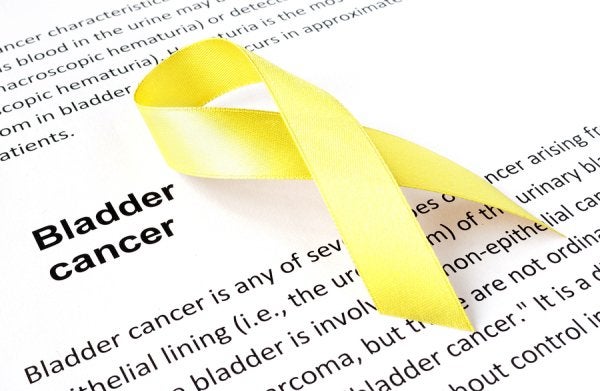-
How is Bladder Cancer Diagnosed and Treated?
Bladder cancer accounts for about 90% of all cancers of the urinary tract, and transitional cell carcinoma makes up about 90% of all bladder cancers. According to the American Cancer Society, about 75,000 new cases of bladder cancer have been diagnosed so far in 2015. The good news is that the long-term prognosis for people who have bladder cancer is better today than ever before. This brief article touches on bladder cancer diagnosis and treatment, and explains how to set up a bladder cancer screening with a urologist in Nashville.

Bladder Cancer Symptoms
Before a doctor can examine you for bladder cancer, you must first exhibit or recognize one of the symptoms of bladder cancer in order to seek a diagnosis. The most common symptoms of bladder cancer include blood or blood clots in the urine, chronic pain during urination, urinating small amounts frequently, and a frequent occurrence of urinary tract infections. Symptoms of more advanced cancer include pain in the lower back around the kidneys and a growth in the pelvis area near the bladder.
Diagnosing Bladder Cancer
The first thing your doctor will do is perform a physical exam and ask questions regarding your lifestyle, exposure to cancer-causing chemicals, and family history of cancer. A urologist will collect a urine sample to check for the presence of blood, infection, and other abnormal cells that indicate bladder cancer. If the urologist has any cause for concern, he or she will perform a cystoscopy to look at your bladder using a thin, lighted tube and take biopsies of abnormal areas to test for cancer cells or tumor markers. If cancer cells are detected, various tests will be performed to classify the stage and grade of the bladder cancer.
Treating Bladder Cancer
Treatment for bladder cancer depends on the stage and grade of the cancer, as well as your age, overall health, and quality of life. Treatment options for bladder cancer include surgery, chemotherapy, radiation therapy, and immunotherapy. Bladder cancer prognosis is highest for people who get treated early, so don’t hesitate to get screened if you notice any of the symptoms of bladder cancer.
You can count on the experienced urologist at Urology Associates P.C. to answer all of your questions regarding bladder cancer diagnosis and treatment . Contact us online or call us at (888) 329-7700 to schedule a bladder cancer screening in Nashville or to learn about your bladder cancer treatment options in Tennessee if you have already been diagnosed with the disease.
-
A Closer Look at Kidney Stone Disease
Kidney stone disease is a common problem treated by urologists in Tennessee, affecting about one in eight people. However, treating kidney stones is much more difficult than preventing kidney stones in the first place. This video from Urology Associates P.C. discusses the disease, as well as providing tips for preventing kidney stones.
If you believe you are suffering from kidney stones, contact the experts at Urology Associates P.C. We are Nashville’s leading urological care provider, with more than 75 years of experience and more than 30 urologists who treat patients at our various locations throughout Tennessee. Contact us online or call us at (888) 329-7700 to schedule a kidney stone screening with one of our experienced urologists. We also invite you to check out our website to learn more about the conditions we treat and the specialty services we provide, including the only free-standing urology surgery center in Middle Tennessee .
-
Women’s Sexual Health Course in Orlando
Brooke Faught, MSN, WHNP-BC, IF, is the clinical director of the Women’s Institute for Sexual Health , WISH, at Urology Associates P.C. located in Nashville, Tennessee. Brooke Faught, a board member of the National Associates of Nurse Practitioners in Women’s Health (NPWH) and fellow of the International Society for the Study of Women’s Sexual Health (ISSWSH), helped organize and was a keynote speaker at this years’ Women’s Sexual Health Course in Orlando. The course was co-sponsored by NPWH and ISSWSH, and was dedicated to furthering the understandings of female sexual problems.
Brooke Faught lobbied alongside her colleague, Vikki Pedigo, MSN, WHNP-BC, on Capitol Hill and testified in front of the FDA in June 2015 on behalf of gender equality which aided in the landmark decision to approve the first ever medication, Flibanserin, to treat Hypoactive Sexual Desire Disorder for women.
The various afflictions for female patients is becoming more prominent in the medical field as more women speak out about their ailments. New diagnostic and management strategies are becoming available to medical professionals and the Women’s Sexual Health Course allows them to gain the necessary knowledge, skills, and professionalism required for excellence in the practice of sexual medicine.
The Women’s Sexual Health Course reached attendance capacity months in advance of the meeting date, and had 50 members on the waiting list. The NPWH and ISSWSH foundations are looking to expand the WSHC courses to twice annually to better accommodate all of those interested in learning more about helping women fight against sexual disorders.

-
Highlighting Healthy U: Causes and Treatments for an Overactive Bladder (OAB)
Dr. Joel Locke, Dr. William Tissot and Alison Skidmore held a luncheon for Williamson Medical Center’s Healthy U: Causes and Treatments for an Overactive Bladder (OAB). The discussion addressed the causes and treatments for an overactive bladder and other urological issues. For more information regarding seminars and discussions please visit our News and Events page at Urologynashville.com .
-
Symptoms, Causes, and Treatment of Kidney Stones
If you’ve ever had kidney stones , then you know how painful they can be. These hard mineral clumps can cause extreme discomfort as they pass through your urinary system, and can cause urine to back up if they get stuck in a ureter or in your bladder. The good news is that your urologist can help you manage the pain associated with kidney stones and even help you prevent them in future. Continue reading to learn about recognizing the signs of kidney stones as well as understanding the causes and treatment options for them.

Symptoms
If the kidney stones are very small, they may not cause any symptoms at all. Urologists refer to these as silent stones. Larger stones, however, cause a range of symptoms. Pain is the most common. It usually comes on suddenly and may appear as cramping in the side, abdomen, groin, or lower back. It comes in waves but does not improve with rest and is usually quite severe. Nausea, vomiting, fever, and difficulty urinating may accompany the pain.
Causes
Kidney stones form when an excess of the minerals that form stones appears in the urine or when urine volume declines. A number of different factors can cause this to occur, including dehydration from inadequate fluid intake and urinary tract infections (UTI). Many medical conditions can increase the risk of kidney stones, including gout and diabetes. Some medications, such as diuretics, and dietary factors, such as a high-protein diet, can also contribute to kidney stone formation.
Treatment
Depending on the size of your kidney stone, it may pass on its own, and you may only need pain medications to ease your symptoms. If your stone is too large to pass without treatment, your urologist may prescribe medications or use a procedure called lithotripsy, during which shock waves are used to break up the stone. Surgery to remove the stone is also possible.
At Urology Associates P.C. , our doctors can help you get relief from the intense pain of kidney stones in Nashville, and help you develop strategies for preventing future bouts. If you’re experiencing the symptoms of a kidney stone, call us at (888) 329-7700.
-
What Causes Urinary Incontinence?
 If you’re experiencing a loss of bladder control, or urinary incontinence, make an appointment with your urologist in Nashville . This condition, which often causes embarrassment, is treatable. Your urologist can pinpoint the cause of your incontinence, and work with you to develop a treatment plan and resolve your symptoms.
If you’re experiencing a loss of bladder control, or urinary incontinence, make an appointment with your urologist in Nashville . This condition, which often causes embarrassment, is treatable. Your urologist can pinpoint the cause of your incontinence, and work with you to develop a treatment plan and resolve your symptoms. It’s important to recognize urinary incontinence as a symptom of an underlying problem, rather than a disease itself. By addressing the underlying issue, your urologist can treat your incontinence. Common causes include bladder and pelvic floor muscle weakness, nerve disorders, and vaginal prolapse. Birth defects, a UTI, and even constipation can also cause incontinence. Depending on the cause, your urologist can treat your incontinence with medications, surgery, or lifestyle changes.
Urinary incontinence is not a normal part of aging, and you do not have to live with it. Schedule a consultation at Urology Associates P.C. to get on the road to recovery. To make an appointment, call us at (888) 329-7700.
-
A Patient’s Guide to Urinary Tract Infections
One common reason why people visit a urologist in Nashville is for urinary tract infections. Urinary tract infections, or UTIs, can happen in both men and women, but women are much more prone to getting them. By understanding UTIs better you can learn to spot the symptoms and get treatment early, before the infection becomes severe. Here is what you need to know.

What Causes Urinary Tract Infections?
Urinary tract infections occur when bacteria are introduced to the urinary system. This can happen from not wiping from front to back after using the bathroom or from sexual contact. When bacteria enter the system, they can travel from the urethra to the bladder, and eventually to the kidneys. When a UTI spreads to the kidneys, the infection can be serious and urgent treatment is required.
What Are the Symptoms?
UTI symptoms include a burning sensation during urination and a strong urge to urinate with only a small amount of urine actually passing. You may notice that your urine smells strong or that it is cloudy or has blood in it. Pain in the lower back also often accompanies a UTI. If you experience a fever with a UTI, it usually means that the infection has spread to your kidneys.
What Are the Treatments for Urinary Tract Infections?
UTI treatment usually involves taking antibiotics and drinking plenty of water to flush the bacteria out of your body. Cranberry juice is also helpful. If your UTI is painful, your urologist may also prescribe pain medication. For less severe pain, try using a heating pad to ease your discomfort.
At the first sign of a UTI, make an appointment at Urology Associates P.C. for diagnosis and treatment. Attacking a UTI early will prevent it from spreading and becoming more serious. To schedule an appointment with one of our urologists, please call (888) 329-7700.
Recent Posts
categories
- Uncategorized
- Bladder Cancer
- Women's Sexual Health
- MonaLisa Touch
- Urology
- Urologist
- Erectile Dysfunction
- Kidney Cancer
- Incontinence
- Prostate
- MonaLisa Touch Laser Treatment
- Kidney Stones
- Urinary Tract Infections
- Event
- Sexual Dysfunction
- Testicular Cancer
- Prostate Cancer
- Urology Surgery Center
- urinary incontinence
- vaginismus
- noncoital pain disorder
- Hypoactive Sexual Desire Disorder
- Infographic
- provenge
- Xofigo
- robotic surgery
- hormone replacement
- diabetes
- renal cell carcinoma
- pelvic pain
- hematuria
- sexual health
- chronic testicular pain
- premature ejaculation
- Men's Health Clinic
- Dr. Melvin Seard
- Interstitial Cystitis
- vasectomy
- overactive bladder
- vaginal atrophy
- nocturia
- bladder infections
- urethral strictures
- Acute Epididymitis
- low sex drive
- circumcision
- pelvic floor dysfunction
- Peyronie's Disease
- prostatitis
- female sexual dysfunction
- varicocele
- difficult urination
- low libido
- PSA levels
- male fertility
- penile prosthesis
- prostatic intraepithelial neoplasia
- male infertility
- estrogen levels
- nurse navigator
- stress urinary incontinence
- vaginal yeast infection
- elevated psa
- painful sex
- adult circumcision
- epididymitis
- OAB
- kidney infection
- penile cancer
- pelvic organ prolapse
- Vasectomy Reversal
- bone health
- cystectomies
- clinical trials
- bloody urine
- Advanced Therapeutic Center
- WISH MedSpa
- neurogenic bladder
- WISH Team
- prostate biopsies
- BPH
- fecal incontinence
- lithotripsy
- osteoporosis
- kidney cysts
